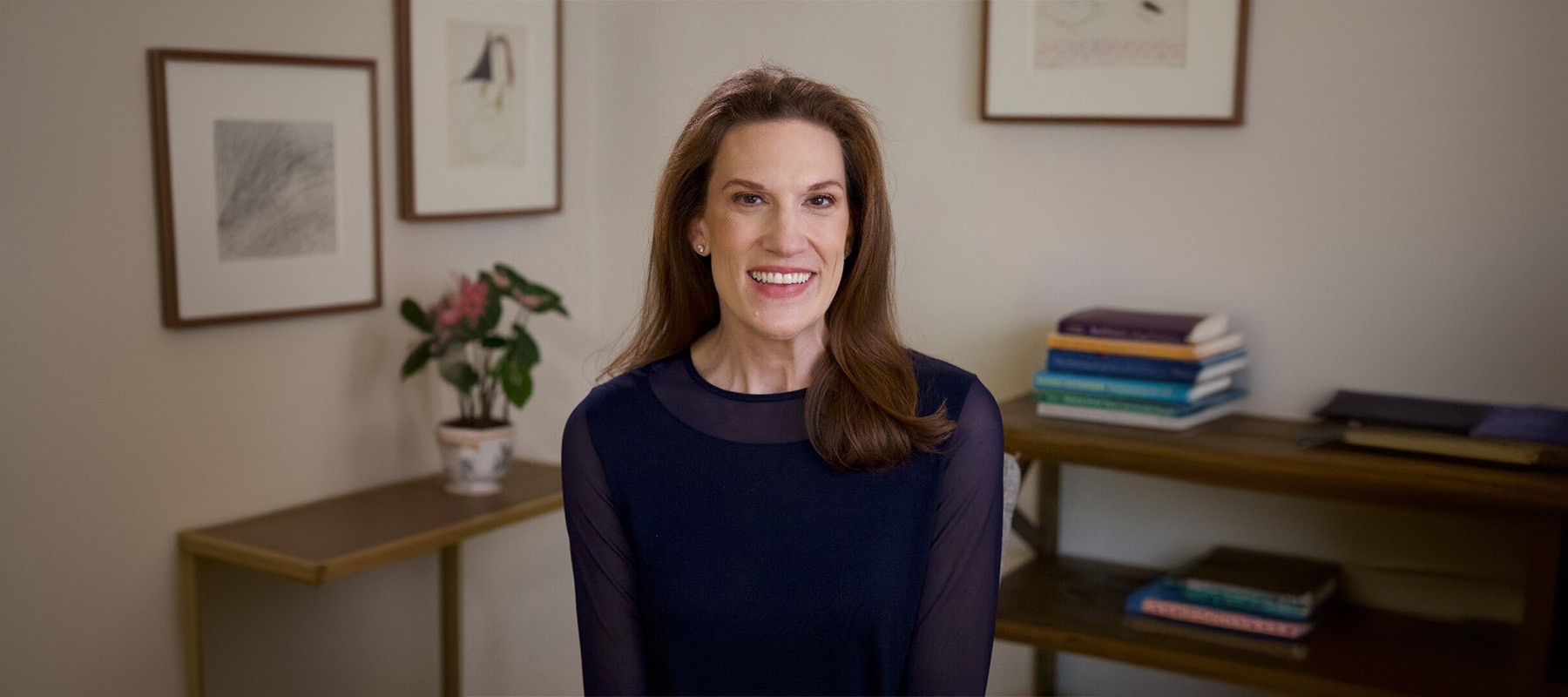How ‘radical collaboration’ can unlock trapped value in industrial data
Breaking down data silos and fostering trust across companies could unlock major gains in industrial efficiency. Caspar Herzberg calls this “radical collaboration.”...
December 19, 2023 • by Alyson Meister in The Interview • 
Morra Aarons-Mele, author and host of the Anxious Achiever podcast, discusses the strategies to help turn anxiety into a leadership superpower....
Anxiety often gets a bad rap. Yet for millennia, it has arguably helped keep us alive. It can also be a huge motivating factor that pushes us to excel. For this reason, many high achievers are known to experience anxiety, explained Morra Aarons-Mele, an award-winning podcaster and author of The Anxious Achiever – Turn Your Biggest Fears into Your Leadership Superpower.
“Without anxiety, nothing would get done,” she told me in a recent video interview. “As David Barlow says, we wouldn’t have planted crops; we certainly wouldn’t innovate. We wouldn’t make art, we wouldn’t win medals at the Olympics, we wouldn’t show up and kill it at work.”
It’s important to note that anxiety exists on a spectrum and to distinguish between “good” anxiety, which is a temporary state that passes, and chronic anxiety that drains our battery, said Aarons-Mele, who herself suffers from an anxiety disorder.
As a leader, it sometimes helps to be anxious. “They’re paid to anticipate worst-case scenarios, to have a plan, to be good in a time of crisis or uncertainty, and to have creative solutions. Anxiety can drive that and help it,” she said.
Yet there is a tipping point when too much anxiety can be detrimental for the individual and the rest of their team. The key question to ask is whether your anxiety is serving or draining you.
“If you are anxious during the pandemic because you are trying to manage a team in a time of huge change, and you can’t look six steps ahead of yourself, I think that’s appropriate,” she said. “If you are waking up every single day, even when things are good, and you are feeling the worry, the swirling brain… that might be time to get help.”
Leaders who experience chronic anxiety often unintentionally act it out on their teams. They may try to control things or worry so much about the outcome that they won’t let other people do their job. Anxiety can also be contagious. “We think we need to do things alone. We think we always need to be right. We think we have to be perfect. We always show up expecting to get fired or for the worst piece of news to happen. Not only is this hard for us, it’s really hard for everyone around us too.”
So, what can we do to make sure our anxiety remains more of a help than a hindrance in our daily lives?
There are often cognitive, emotional, and physical clues to watch out for. Are you ruminating or overthinking? Are you starting to feel dread? Is your behavior becoming too controlling? It’s also vital to tune into your body.
“Years ago, I learned to play detective, as Rebecca Harley calls it,” recalled Aarons-Mele. “For me, my tell is my shoulders and jaw. Some people’s tell might be they don’t sleep well, their appetite changes, they feel jumpy, they can’t concentrate. People tell me they often feel a tingling in their body. We may have behavioral changes or we may have emotional changes. So, it’s really important to start to tune in.”

“Organizations need to provide managers with training to build skills to emotionally support their team members”- Morra Aarons-Mele
It also helps to understand that anxiety is common. On any given day, over a third of Americans are diagnosed with anxiety, said Aarons-Mele, while the World Health Organization has classified it as the most common mental health disorder globally.
There are a lot of tools that people can use to help manage their anxiety, ranging from cognitive behavioral therapy to mindfulness and breathwork to help relax and calm the nervous system.
Spending our days staring at screens or scrolling on our devices has been shown to impact our breathing, said Aarons-Mele. Taking a break to practice a few minutes of intentional deep breathing, to tune into your pulse and your heartbeat, can help you come back to yourself.
While Aarons-Mele doesn’t think that we can be physically or neurologically more anxious than previous generations, she acknowledges that the digitization of our society makes it harder for us to disconnect from what is happening in the world is driving our anxiety.
“Social media was designed to trigger us. That’s the business model. And one of the interesting things that’s happened in work, especially post-pandemic, as most of us have moved to different schedules, we’re more hybrid. We’re more reliant on digital interfaces like Slack, Teams, email, and text, all of which are designed to keep us in a state of heightened arousal. So of course, we’re more anxious.”
So, what can leaders do to help manage the anxiety of others?
First, managers need to reflect on how they experience anxiety. “It’s important, even if you don’t consider yourself an anxious person, to get introspective and to really understand your mind, body, and spirit as a leader,” she said.
For many people, this can be uncomfortable because they weren’t raised in an environment or a culture where they were permitted to feel, while there is often a misconception that we are asking leaders to become therapists. Organizations need to provide managers with training to build skills to emotionally support their team members. This can be as simple as asking whether they feel energized or overwhelmed and what you as a manager can do to support them.
Aarons-Mele’s work centers around changing our understanding of mental health and success and reducing the shame around the topic of mental illness and anxiety. While leaders often feel they need to be tough to maintain an air of competence, recent research shows that admitting your vulnerabilities can increase employees’ confidence in your abilities.
Talking openly about your struggles can also be beneficial for your team. Aarons-Mele shared the case of Jimmy Horowitz, a senior executive at NBC Universal, who suffered through clinical depression in silence at work. When the pandemic broke open the mental health floodgates, Horowitz was asked to be the executive sponsor of a mental health task force, without his employer being aware of his mental health struggles.
The request prompted Horowitz to come clean about his depression. This not only helped others feel more seen, but it also changed Horowitz’s attitude to leadership. Having been raised in the old-school Hollywood world, where employees didn’t go home before their boss, he realized he wanted to encourage his team to live their whole lives.
Too often, leaders, especially high-achieving perfectionists, end up reaching a crisis point before they seek help, said Aarons-Mele. On the surface, they are swan-like, gliding calmly across the surface, but underneath they are paddling frantically. “They end up in hospital. They think that they are having a heart attack because they’re having panic anxiety that is so intense. They have burnout, and they turn to substances,” she said.
By changing the narrative around leadership and debunking myths that you need to be invulnerable, Aarons-Mele is working to make sure that people learn to get help before they end up in crisis.

Speaker, workplace mental-health consultant, and author Morra Aarons-Mele helps leaders and teams turn anxiety into a superpower to lead at their highest level. An anxious achiever herself, Morra believes taking mental health seriously is a leadership strength. Recognized by Mental Health America with their Media Award (2023), she is also a LinkedIn “Top 10 Voice” in mental health and a Thinkers50 2023 Distinguished Achievement in Leadership Award nominee. Morra’s clients include Fortune 500 companies, startups, and U.S. government agencies. She hosts the Top 10 Management podcast “The Anxious Achiever” for LinkedIn Presents, featuring CEOs, psychologists, and leadership experts. This podcast is a Webby Awards Honoree and “Best Commute” Signal Award winner.

Hilti Professor of Leadership and Dean of Degree Programs
Alyson Meister is Hilti Professor of Leadership and Dean of Degree Programs at IMD. Specializing in the development of globally oriented, adaptive, and inclusive organizations, she has worked with executives, teams, and organizations from professional services to industrial goods and technology. She also serves as co-chair of One Mind at Work’s Scientific Advisory Committee, with a focus on advancing mental health in the workplace. Follow her on Twitter: @alymeister.
December 11, 2025 • by Michael R. Wade in The Interview • 4 min read
Breaking down data silos and fostering trust across companies could unlock major gains in industrial efficiency. Caspar Herzberg calls this “radical collaboration.”...
December 4, 2025 • by Zhike Lei in The Interview • 8 min read
Former Novo Nordisk CSO Marcus Schindler shares insights on pharma R&D, scientific innovation, AI integration and global talent development...
November 14, 2025 • by Didier Bonnet in The Interview • 6 min read
AI has evolved from skepticism to ubiquity, transforming work and productivity while exposing deep limitations in truth, reliability, and human dependence....
November 3, 2025 • by Susan Goldsworthy in The Interview • 7 min read
Olympic champion Oliver Zeidler shares how resilience, reinvention, and a beginner’s mindset shaped his journey from sports to MBA and leadership growth....
March 11, 2025 • by Mark J. Greeven in The Interview • 8 min read
Haier's CEO Zhou Yunjie explains how the company's innovative "RenDanHeYi" model empowers employees, drives global growth, and adapts to market changes....
February 12, 2025 • by Marleen Dieleman in The Interview • 8 min read
Tolaram, the Singapore-headquartered family business, has global interests in logistics, consumer goods, and technology. Family members Mohan Vaswani and Sajen Aswani discuss the company’s values-based system of meritocracy, the family’s move to...
January 14, 2025 • by Peter Vogel in The Interview • 8 min read
In conversation with IMD's Peter Vogel, Bruce Grossman, a fourth-generation family business owner, discusses his achievements and shortcomings in creating frameworks to unite the family business....
December 3, 2024 • by Peter Vogel in The Interview • 8 min read
Cristina Carvajal, President of one of Latin America’s most respected family enterprises, discusses the benefits of having a family member as the CEO of the family business....
October 25, 2024 • by Didier Bonnet in The Interview • 6 min read
Legendary football referee Pierluigi Collina is interviewed by IMD's Didier Bonnet....
October 8, 2024 • by Didier Bonnet, Brian Eno in The Interview • 9 min read
Brian Eno talks to IMD's Didier Bonnet about how to unleash the most unexpected innovations....
 Audio available
Audio availableExplore first person business intelligence from top minds curated for a global executive audience